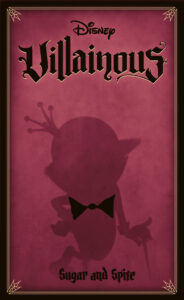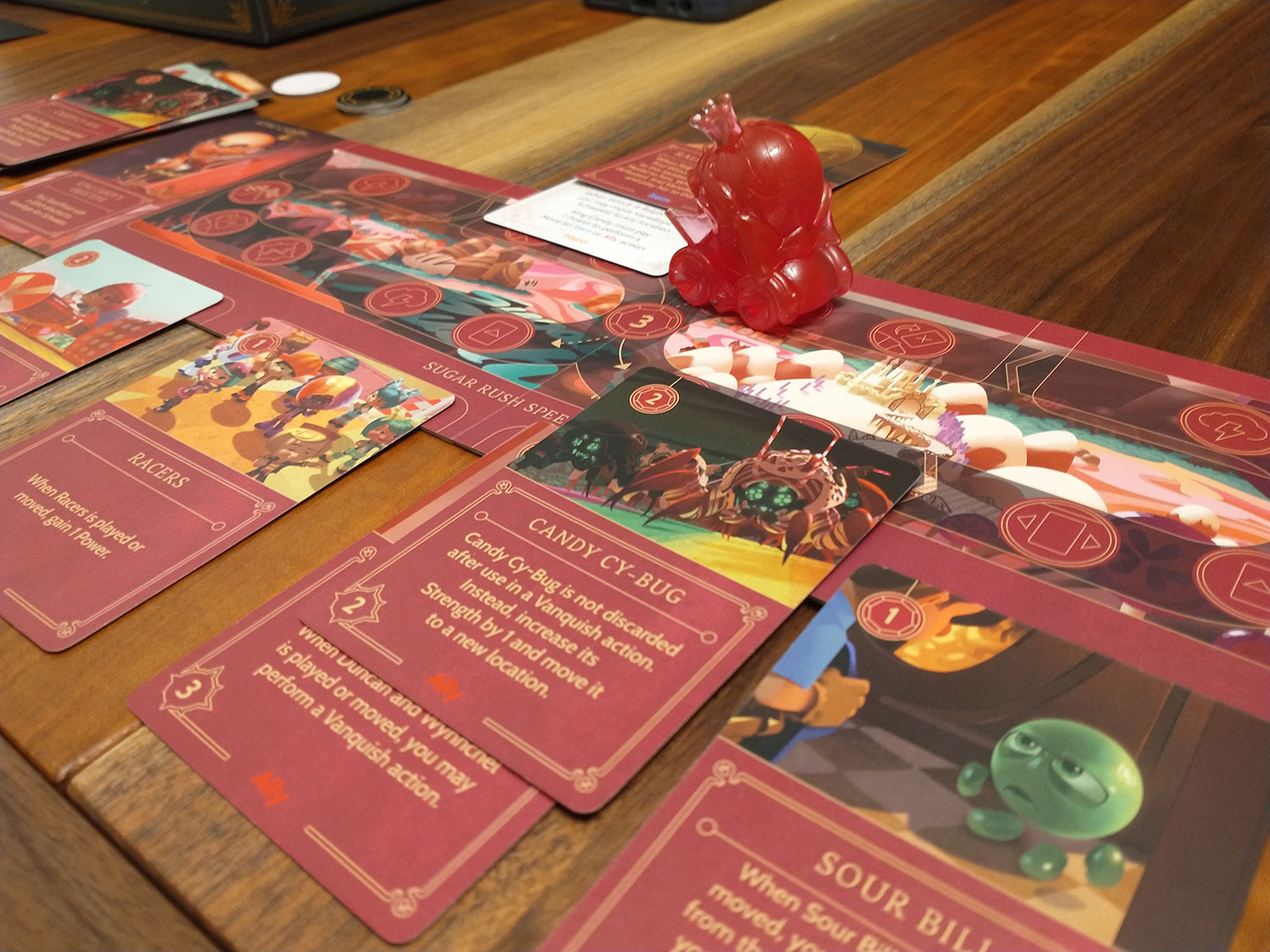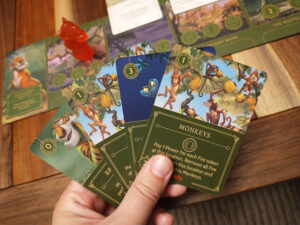 Villainous is probably the worst game I like. It has elements, such as “take that”, I normally don’t enjoy in games, yet I have fun playing them. I think it’s because of the asymmetric style and variety of characters, familiar though sinister. I’m always excited and impressed to see what approach the designers take to each character: how will they play compared to those that came before? How can they be different enough without changing the core of the game?
Villainous is probably the worst game I like. It has elements, such as “take that”, I normally don’t enjoy in games, yet I have fun playing them. I think it’s because of the asymmetric style and variety of characters, familiar though sinister. I’m always excited and impressed to see what approach the designers take to each character: how will they play compared to those that came before? How can they be different enough without changing the core of the game?
Today I’m looking at the latest set in the Disney Villainous line, Sugar and Spite, featuring Wreck-It Ralph’s King Candy and the Jungle Book’s Shere Khan. This set can serve as a two-player standalone, but the characters can compete against any of the other villains in the Disney Villainous repertoire. Listed playtime is 40 minutes.
Gameplay Overview:
If you’re unfamiliar with the rules of Villainous, I’ll first cover those briefly. Each player board depicts that villain’s “realm”, and each realm is made up of five locations. On your turn, move your villain pawn to a new location and take any or all of the actions depicted there. Once you’ve carried out all actions you care to take, draw back up to a hand of four cards and your turn ends. The first villain to accomplish their unique goal wins the game. If you want to know the full ins and outs, check out Tony’s review of Villainous here.

The characters in this expansion, like all of the Villains, have their own unique playstyle and ruleset. Shere Khan’s objective is to defeat Mowgli (who can be found in his fate deck) while there are no fire tokens in his realm. Fire tokens are unique to Shere Khan and are typically placed through fate cards; they cover specific actions in a location, preventing him from taking that action. He has ways to remove these fire tokens through the use of his cards.
King Candy is the first Villain to use a different board layout and method of movement. Rather than having locations, his player board depicts a race track. On his turn, King Candy can move 1-4 spaces and take the action he lands on, as well as the one behind and ahead of him. There are still slots for fate cards to be placed, which can cover some of his available actions as normal. His objective is to beat Vanellope Von Shweetz in a race, but in order to do that she must first be in his realm (she is in his fate deck) and King Candy must play a glitch card on her. When the glitch is played to Vanellope, both her token and King Candy’s pawn are placed at the start/ finish line. From then on, at the beginning of King Candy’s turn, he will draw the top card of his villain deck and Vanellope will move forward a number of spaces equal to that card’s cost plus two. If King Candy passes the finish line first, he wins the game, but if Vanillope passes finish first, the race will need to be restarted; Vanellope remains in play, but her glitches are removed and another will need to be placed on her in order to race again.

Game Experience:
These two villains are very different from one another, and not just thematically. Shere Khan’s play style is straightforward, he’s always one turn away from winning, almost literally. In one game he actually won in four turns, and my husband and I worked out that, with the right card draw, he is capable of winning in three turns. This means opponents need to put constant pressure on him through the Fate action. A couple of fire tokens are easily dealt with, but getting bombarded with them will be his downfall. I would venture to say he is the most formidable villain in the lineup yet. If you don’t attack him frequently, he will win. As with all villains, there are key cards that will make his victory come more quickly, so you will need to do some deck churning, but not as aggressively, perhaps, as with some villains.

King Candy, on the other hand, takes the slow path to victory. Like many villains that came before, he has multiple conditions that must be met in order to achieve victory. First, Vanellope needs to be in play, and if anyone draws her during a Fate action they won’t play her since that actually helps King Candy. In fact, there’s really almost no point in attacking Candy until the race begins since most Fate cards affect the race. That means he’s usually doing some major deck churning in order to look for one specific card. That specific card brings Wreck-It Ralph into play. Once Ralph is in play, you must Vanquish him and, when he is defeated, Vanellope automatically comes into play. By this time you most certainly have a glitch you’ve been holding onto, which you can play on her and the race can begin, finally! But… you still need to win, which is going to take several more turns. Despite all of these steps, King Candy is a lot of fun to play as! The unique way he moves around the board makes for a refreshing change. And don’t call his player color pink! “It’s obviously salmon…”

Given these two playstyles, the dynamic in this set is interesting. King Candy is already dealing with a lot and on top of that he needs to attack Shere Khan as often as he can. Shere Kahn doesn’t really care about attacking him in return (early on), so he’s just trying to deal with all that fire, and when you play as him you really do feel you’re constantly on the edge of victory, which can be frustrating.
Let me clarify that I think these are two excellent villains; but I do not necessarily think they are excellent against each other. In fact, I don’t think Shere Khan is ideal for two player games in general because it turns into a slug fest. The other player, whoever they’re playing as, has to attack Shere Khan as often as they can while clawing their way toward victory. A multiplayer game allows for the attacks to be more balanced out among the players, while a two-player game might be rather drawn out.
These two characters also have a new feature I don’t think we’ve seen before: cards that can be played without using a “Play a card” action. This is helpful and may even be necessary for Shere Khan, since fire tokens can be placed over lower actions while hero cards can cover upper actions in his realms, greatly limiting what he can do.
Final Thoughts:
Despite that Shere Kahn needs constant pressure and can feel frustrating to play as, and that King Candy has several hoops to jump through before he can even begin to start winning, also frustrating, these two characters are solid entries into the Disney Villainous lineup. Being frustrated as the villain is nothing new with this game. Victory is out of reach for villains in the films, so why should it be easy in the board game, especially when others are trying to foil their plans?
My biggest critique is that I don’t think these two are necessarily good together as a standalone set, which means I wouldn’t recommend new players start with this one. But as an expansion for people already familiar with the game, Sugar and Spite gets top marks. I’m constantly impressed by the ingenuity of the game’s designers as they come up with new ways to keep the characters interesting without feeling redundant.
Final Score: 4 stars – Not a set to start with, but a great addition for fans of the game.
 Hits:
Hits:
• Introduces new and interesting mechanisms
• Both characters are well designed and feel thematic
Misses:
• Maybe not an ideal pairing as a standalone set
• Some might be put off by the aggressive play style required for Shere Khan





















